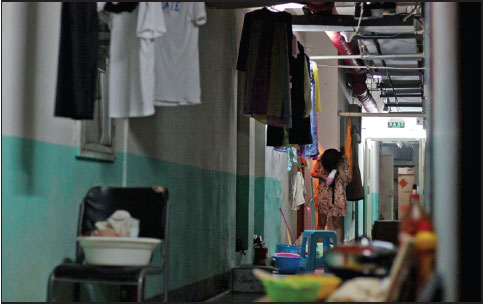Construction boom fails to clear China's crowded cities
By Wang Yanfei (China Daily) Updated: 2016-09-23 10:12|
|
Staying put
Liang Yi, an engineer in Zhongguancun, a hi-tech industrial development zone in Beijing's Haidian district, lives in a subterranean apartment three subway stops from his workplace.
He rents a small room from a family and although has to endure his landlord's babies crying incessantly in the next room, Liang refuses to move to a new district.
"The long hours of commuting would kill me," he said. "If I could find a job in a new district that paid the same as the one in Zhongguancun, I'd go, but there aren't any good opportunities."
He isn't considering returning to Jinan, his hometown in Shandong province, either: "I wouldn't be able to find anywhere like here, this place offers such good prospects and an exciting life."
Shen, from the planning institute, said there are a range of policy tools the government could use to prevent imbalanced development and achieve more-inclusive growth.
He suggested that local governments should abandon the old real-estate-driven growth model and quicken the pace of development to help boost the real economy of tangible goods and services.
Referring to the National New-Type Urbanization Plan (2014-20), Shen noted that China has already released top-level guidelines, but said the scenario would be different if local governments were allowed to formulate their own plans.
"It would partly depend on how determined local governments were to stop relying on massive land sales," he said. "They have the policy toolkits to improve efficiency of land use and place greater focus on building healthcare services and educational facilities."
He added that young people need to be provided with more policy support and job opportunities, and that local governments should produce new policies to attract talents.
If that could be achieved, it would be good news for those already living in the new towns and also for potential residents. It might also mean that Lyu wouldn't need to spend hours waiting for a bus, and, as new avenues of employment opened up, Liang might eventually move to the suburbs.
Contact the writer at wangyanfei@chinadaily.com.cn
- First rapid response police unit 'fit',
UN says - Space lab begins tests in orbit, prepares for visit by astronauts
- Structure reshuffled to benefit environment
- Li: Beijing will open door wider
- Escaped fish put old species at risk
- Table tennis marriage takes place in Japan
- High-tech tools to fight fraudsters
- Death toll from SW China storm rises to 9
- Recovery of fugitives' illegal assets is focus of new initiative
- Experts: Mainland's new Taiwan measures show responsibility












